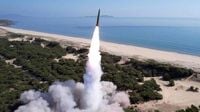On May 9, 2025, French President Emmanuel Macron and Polish Prime Minister Donald Tusk gathered in Nancy, France, to sign a significant treaty aimed at strengthening defense ties between their two nations. This treaty comes amid rising tensions in Eastern Europe, particularly due to Russia's ongoing aggression in Ukraine, which has lasted over three years.
The two leaders arrived at the historic Place Stanislas at 1:15 PM local time (11:15 AM GMT) to formalize what they termed a "treaty of friendship and enhanced cooperation." This agreement signifies Poland's growing role within Europe, particularly as a key player on NATO's eastern flank.
The signing coincided with Europe Day, a celebration marking 75 years of European integration, further emphasizing the importance of unity in the face of external threats. Just 2,600 kilometers away, Russian President Vladimir Putin showcased military strength with a grand parade in Moscow, commemorating the 80th anniversary of the victory over Nazi Germany.
In light of the ongoing war in Ukraine, which has shown no signs of abating despite promises from former U.S. President Donald Trump to end it, the treaty includes a mutual defense clause. Tusk highlighted that this clause would allow for cooperation in nuclear deterrence, reinforcing the notion that French nuclear capabilities carry a European dimension.
"The mutual support clause in case of aggression against either of our countries is the very essence of this treaty," Tusk stated, emphasizing the commitment to provide military assistance to one another in times of need. Macron reiterated the importance of this solidarity, stating, "French nuclear deterrence has a European component, and in this treaty, we are sealing an even stronger solidarity that operationalizes what is already in NATO's Article 5."
This treaty marks a significant upgrade from a previous agreement made in 1991, which was less ambitious and came during Poland's transition away from Soviet influence.
Besides defense, the treaty aims to enhance cooperation in infrastructure and energy sectors. Macron expressed his desire to elevate relations with Poland to the same level as those established with Germany, Italy, and Spain through earlier treaties. "Poland has been a partner that we have somewhat neglected for too long," admitted French Minister for Europe Benjamin Haddad.
With a population of approximately 38 million, Poland has significantly modernized its military, becoming a crucial political and military player in Europe, particularly in light of the perceived Russian threat. Previously reliant on U.S. support for defense, Poland has been shaken by the uncertainty stemming from Trump's ambiguous stance on European security.
Warsaw has shown keen interest in Macron's proposal for a European nuclear umbrella, a notion Tusk described as "very promising" earlier this year. This interest aligns with Poland's ongoing military modernization, which includes acquiring transport aircraft, refueling planes, and submarines.
Macron's administration is keen to strengthen military and diplomatic coordination in the region, aiming to reduce U.S. dominance in discussions with Poland. This also presents an opportunity for France's defense industry, as Poland seeks to bolster its military capabilities.
The treaty's signing took place in a historically rich setting, as Nancy was once the residence of Stanislas Leszczynski, the former King of Poland who became Duke of Lorraine after being exiled by Russian and Austrian forces.
In a related development, on the same day, North Korea launched several short-range ballistic missiles towards the Sea of Japan, as reported by South Korea. This launch, which occurred between 08:10 and 09:20 local time (23:10 and 00:20 GMT), marked the first missile test by North Korea in nearly two months, with the last occurring on March 10, 2025.
The South Korean military reported that the projectiles fell into the sea approximately 800 kilometers from the North Korean coast, raising alarms about regional stability. The South Korean Joint Chiefs of Staff condemned the launches as a clear provocation and a serious threat to peace.
These missile tests come in the wake of North Korea's ongoing military developments, including the unveiling of a new 5,000-ton destroyer, the Choe Hyon, which is set to enter service in early 2026. This destroyer is believed to be capable of carrying tactical nuclear missiles, although North Korea has yet to demonstrate the ability to miniaturize its nuclear weapons.
In a broader context, the military cooperation between North Korea and Russia has intensified, particularly following a mutual defense treaty signed in June 2024. This agreement obligates both nations to provide military assistance in the event of an attack and to collaborate internationally against Western sanctions.
Additionally, the South Korean government accused North Korea of supplying Russia with missiles and artillery, further complicating the geopolitical landscape. The recent missile launch could potentially serve as a precursor to further military cooperation with Russia.
As tensions rise both in Eastern Europe and on the Korean Peninsula, the international community watches closely, with the implications of these developments likely to resonate far beyond their immediate regions.




